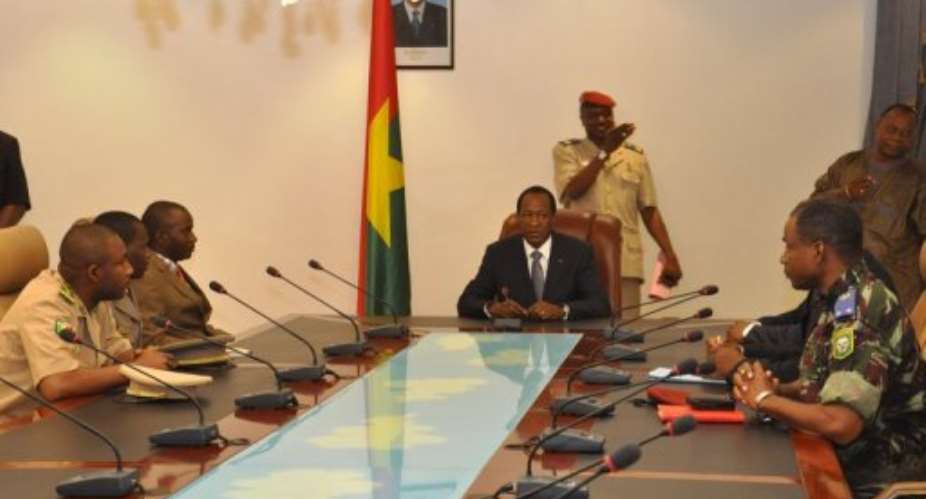OUAGADOUGOU (AFP) - West African mediator Blaise Compaore opened talks Saturday with the military junta that briefly seized power in Mali last month and Malian politicians trying to navigate a way out of the crisis.
The negotiations in Ouagadougou are aimed at finalising last week's accord for a return to civilian rule, said Compaore, president of Burkina Faso.
But he said they would also cover the rebellion that has left northern Mali in the control of Tuareg separatist and Islamist groups.
The talks came as the Islamist group Ansar Dine in northern Mali freed 160 government soldiers captured during fighting.
Al-Qaeda's north African branch meanwhile released a video of two French nationals abducted in Mali last November to Burkina Faso authorities.
Compaore said Saturday's talks were agree a roadmap to "ensure the proper functioning of republican institutions, restore territorial integrity and hold free and transparent elections in a peaceful and secure environment."
He called on Malians to back the transitional government, which is being formed "to strengthen the rule of law, respect republican values and maintain the integrity of the country."
More than 80 people were taking part in the closed-door discussions in a conference hall in Ouagadougou, the Burkina Faso capital. They included senior members of the junta, parliamentary and regional leaders as well as religious heads.
The junta seized power during a coup that toppled president Amadou Toumani Toure on March 22, denouncing the government's ineffective resistance to a Tuareg rebellion which was rekindled in January.
But the rebels took advantage of the disarray in Bamako by capturing an area roughly the size of France, including the ancient town of Timbuktu, in the north.
That sparked warnings from aid agencies of a humanitarian disaster in an area already gripped by acute food shortages and drought.
Coup leaders in April agreed to step down in a deal brokered by the West African bloc ECOWAS in return for an amnesty deal and a lifting of sanctions imposed by the regional body had imposed on landlocked Mali.
Former parliament speaker Dioncounda Traore was sworn in on Thursday as Mali's interim president after Toure officially resigned, a condition of the agreement.
Traore, a 70-year-old mathematician turned politician, is expected to name a prime minister soon, and to organise elections within 40 days.
ECOWAS has raised the prospect of sending a force of up to 3,000 men to try to reclaim the region seized by rebels, if talks being brokered by Compaore were to fail.
The bloc's ministers have insisted that the rebels withdraw from all occupied territories as a precondition for negotiations.
To address the anticipated humanitarian consequences of the crisis, the ministers approved $3.0 million (2.3 million euros) in aid to the legitimate government of Mali; and another $1.5 million to the neighbouring countries of Burkina Faso and Niger.
In northern Mali on Saturday, the Islamist group Ansar Dine freed 160 government soldiers who had been captured during the recent fighting.
An official from the governorate of Gao, Moussa Kante, said the group had also pledged to free other imprisoned soldiers.
Ansar Dine, which controls several key towns, has imposed sharia law in some areas under its influence and distanced itself from the Tuareg separatist cause.
The group has close ties to Al-Qaeda in the Islamic Maghreb (AQIM), which has sent a video of two French nationals Philippe Verdon and Serge Lazarevic abducted in Mali last November to the authorities in Burkina Faso.
The footage, dated February 22, shows Philippe Verdon and Serge Lazarevic sitting on the sand in front of a tent, wearing turbans but with their faces clearly visible.
The two men appear weak but speak clearly and both appeal to France and the international community to work for their release.
AQIM kidnapped the two men on November 16 in Mali's northern town of Hombori, where they were working as geologists for a Malian company.
They are among six French hostages held by AQIM, the four others having been abducted from Niger in September 2010, where they were working for Satom, a subsidiary of the French nuclear group Areva.





 Critics fear Togo reforms leave little room for change in election
Critics fear Togo reforms leave little room for change in election
 Flooding: Obey weather warnings – NADMO to general public
Flooding: Obey weather warnings – NADMO to general public
 Fire in NDC over boycott of Ejisu by-election
Fire in NDC over boycott of Ejisu by-election
 NDC to outdoor Prof Jane Naana Opoku-Agyemang as running mate today
NDC to outdoor Prof Jane Naana Opoku-Agyemang as running mate today
 Ejisu: CPP seeks injunction to stop April 30 by-election
Ejisu: CPP seeks injunction to stop April 30 by-election
 Dismiss ECG, GWCL, GACL bosses over losses – United Voices for Change tells gov’...
Dismiss ECG, GWCL, GACL bosses over losses – United Voices for Change tells gov’...
 Submit 2023 audited financial statements by May – Akufo-Addo order SOEs
Submit 2023 audited financial statements by May – Akufo-Addo order SOEs
 Current power outages purely due to mismanagement – Minority
Current power outages purely due to mismanagement – Minority
 ECG hoists red flag to fight Ashanti Regional Minister over arrest of General Ma...
ECG hoists red flag to fight Ashanti Regional Minister over arrest of General Ma...
 Mahama’s 24hr economy will help stabilise the cedi; it’s the best sellable polic...
Mahama’s 24hr economy will help stabilise the cedi; it’s the best sellable polic...
